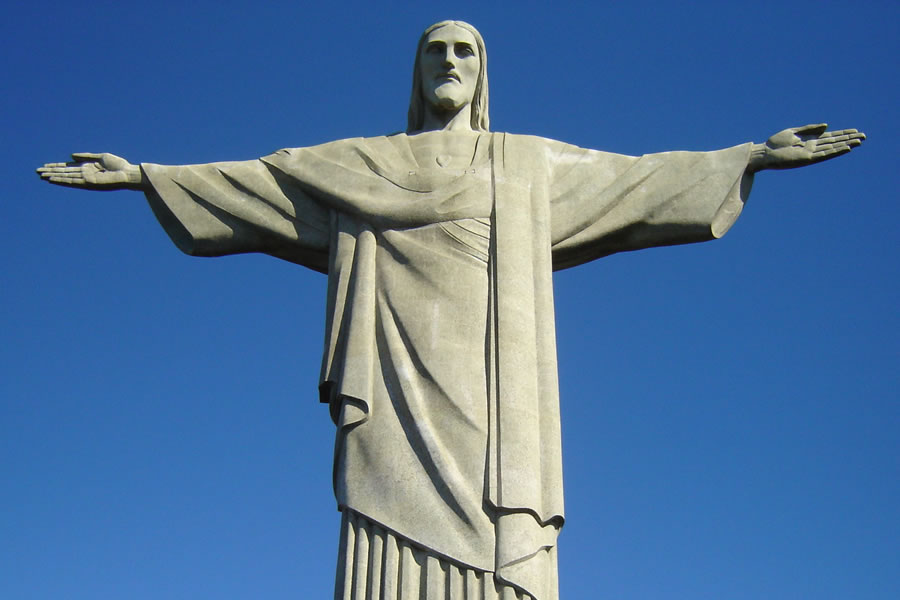
Amen I Say To You, Whatever You Did For One of the Least Brothers of Mine, You Did For Me
11-26-2023Weekly ReflectionFr. Manasseh Iorchir, VCOn the last Sunday of each liturgical year, the Church celebrates the “Solemnity of Our Lord Jesus Christ, King of the Universe” or, “Christ the King.” This Solemnity was established in 1925 by Pope Pius XI with his encyclical Quas Primas (in the first) as a response to growing secularism and Atheism. The Pope noted the unholy attempt by the world to “thrust Jesus Christ and His Holy Law” out of public life, and the resultant discord, distrust and injustice among people and nations. This Solemnity reminds us that while empires and governments come and go, Christ and His reign enjoy permanent duration. The Readings at the Liturgy presents Christ and His Divine reign in this light.
READ MORE
For To Everyone Who Has, More Will Be Given
11-19-2023Weekly ReflectionFr. Manasseh Iorchir, VCWe have arrived at the penultimate weekend to the end of the liturgical year. Next weekend shall be the Solemnity of our Lord Jesus Christ, King of the Universe, and that my friends, will bring us to the end of the liturgical “Year A.” The season of Advent will then begin a new liturgical year. At the end of every calendar year, we often take stock of most aspects of our lives. We take a look at how we are doing financially, many do a comprehensive medical examination to find out where they are healthwise, and most families come together not only to celebrate but to also dialogue on the state of their relationship with one another in the family. The Church, God’s great family where Jesus is the head and we are the body, invites us to effect an introspection, a personal inquiry into how we have used, failed to use, or misused the talents invested in each of us by God’s benevolence.
READ MORE
Therefore, Stay Awake, For You Know Neither the Day nor the Hour
11-12-2023Weekly ReflectionFr. Manasseh Iorchir, VCRobert Baden-Powell, the English soldier who founded the Boy Scouts published the motto, “Be Prepared” in his 1908 handbook, Scouting for Boys. He wrote that to be prepared meant “you are always in a state of readiness in mind and body to do your duty.” A wise person ensures that he stays prepared for any event or activity, especially the ones for which he has been afforded previous information. The Readings at the Liturgy this weekend invite us to make the wise decision of staying awake and prepared for the coming of God’s Kingdom among us.
READ MORE
The Greatest Among You Must Be Your Servant
11-05-2023Weekly ReflectionFr. Manasseh Iorchir, VCIn His unfathomable wisdom, God has blessed every one of us with charisms, the application of these gratuitous gifts when left to the dictates of our individual volitions, usually end up producing self-centered and sometimes harmful results that are injurious not only to our conscience but also to our community and even society. Good leadership is the gap-filler that coordinates our individual talents and applies them for the improvement of our human condition and to the greater glory of God. This is true even in our relationship with God. If everyone of us was asked to determine, on the basis of personal preference, how our relationship with God should be, the result would certainly be unmitigated chaos. This is why even God needs leaders to ensure that the assembly of those who believe in Him and have opted to stay in the right relationship with Him are properly enabled to sustain it. What constitutes good leadership is the unifying theme of the Readings at the liturgy this weekend.
READ MORE
You Shall Love Your Neighbor As Yourself
10-29-2023Weekly ReflectionFr. Manasseh Iorchir, VCSome of us may have experienced how parents, especially mothers, instinctively give more care and attention to any of their children who is impaired, has a disability or is younger than their siblings. The parents tend to “understand” with a disabled child and are more likely to overlook their “transgressions” and to address an “off ense” against them by their siblings. Since we were made in the image of God, it is safe to say that parents, who in their vocation collaborate with God in His benevolent ordering of this world, derive this natural bias towards the disadvantaged from God who is Love itself. God loves us all, but the disadvantaged among us are particular objects of God’s compassion and love. To ensure that they are cared and provided for, God made a Law of Love to protect them from the greed of others. This is the central theme of the Reading of the Liturgy this weekend, that God is love and His greatest commandment is the Law of Love.
READ MORE
Pay to Caesar What Belongs to Caesar And To God What Belongs To God
10-22-2023Weekly ReflectionFr. Manasseh Iorchir, VCThe Readings this weekend are concerned with the right relationship that a Christian believer is expected to maintain between human authority and God. Holy Scripture affirms that despite appearances to the contrary, ultimate control of human history and well-being resides in God’s hands. Human rulers have their place and should be given their just due, but even they are ultimately instruments by which God guides human affairs. So, in the midst of human politics, believers should strive not to be distracted from righteousness, which is the right relationship with God.
READ MORE
On This Mountain, The Lord of Hosts Will Provide For All People
10-15-2023Weekly ReflectionFr. Manasseh Iorchir, VCMount Zion, the mountain on which the Temple was built, was regarded as the holiest site for all adherents of Judaism. It was the political and religious center of Israel and only confirmed beneficiaries of the Old Covenant could claim exclusive rights to her. In Isaiah’s previous oracles (Isaiah 24 and the first few verses of 25), Israel is informed that she has lost favor with the Lord and reminded that she would be restored to favor if she would repent and reconcile with the Lord. In the First Reading, God designates this same mountain as the setting for Universal Redemption. God metaphorically referred to the event as a feast where rich food and choice wine would be served, the place where the veil of ignorance and death woven over all peoples would be destroyed, and the Lord would wipe away the tears from every face. In summary, Jerusalem will be the holy site for the redemption of people from all nations, not just the beneficiaries of the Old Covenant, and for the establishment of the new and everlasting Covenant that will admit all people who are willing, Jews and Gentiles alike.
READ MORE
The Kingdom of God Will Be Taken Away From You and Given to a People That Will Produce its Fruits
10-08-2023Weekly ReflectionFr. Manasseh Iorchir, VCThis weekend, the First Reading and the Gospel provide two parables that describe the covenant relationship between God and the People of Israel. These parables provide a historical explanation for God’s dissatisfaction with the People of Israel that ultimately gave rise to the formation of the “New Israel” (The Church), an expansion of the national relationship God had with Israel to a universal relationship that includes all people who believe.
READ MORE
Have In You The Same Attitude That Is Also In Christ Jesus
10-01-2023Weekly ReflectionFr. Manasseh Iorchir, VCThe Readings last weekend demonstrated how “God’s thoughts are not our thoughts and His ways are not our ways” with the parable of the vineyard owner who paid a flat wage to all his workers despite hiring them at different times. This must have raised in our minds a question about the “fairness” of God who rewards equally all who respond to His invitation to labor in His vineyard. The Readings of this weekend’s liturgy are intended to facilitate further reflection upon the “justice” of God.
READ MORE
For My Thoughts Are Not Your Thoughts Nor Are Your Ways My Ways, Says the Lord
09-24-2023Weekly ReflectionFr. Manasseh Iorchir, VCAs humans, we possess a tendency to do unto others what they do, or are most likely to do, to us. We understand the “tit for tat” rule of Moses and are instinctively inclined to love those who love us. The Readings of this weekend’s Liturgy show how diametrically apart these human theories of morality and justice are from God’s thoughts. We may see justice as giving to each individual what they deserve; God gives to us, not what each person deserves, but what pleases His Divine will.
READ MORE
The Lord is Kind and Merciful, Slow to Anger, and Rich in Compassion.
09-17-2023Weekly ReflectionFr. Manasseh Iorchir, VCIn his letter to the Romans, St. Paul declares, “But God shows His love for us in that while we were still sinners, Christ died for us” (Romans 5:8). This sacrificial act of love for us while we were captives of disobedience is what affected our redemption and shows how ridiculously extravagant God’s mercy is towards us. Having enjoyed God’s mercies, albeit unmerited, we are under every obligation to show mercy to others. This is exactly what the Readings at the liturgy this weekend set out to inculcate in us.
READ MORE
Love Is The Fulfillment of the Law
09-10-2023Weekly ReflectionFr. Manasseh Iorchir, VCMrs Jamie Bescak, Principal of St. John Bosco School, likes to sign her emails with these words from St. Paul, “Do everything in love” (1 Corinthians 16:14). This is a very good summary of what the Readings this weekend invite us to internalize and practice.
In the First Reading, the Prophet Ezekiel, called to prophesy to Israel during the Babylonian exile, is designated a “watchman” over Israel and intimated on the seriousness of his task. If he refuses to dissuade the sinner from his sinful way despite receiving word from The Lord, he (the Prophet) shall be held responsible for the death of the sinner. This is a scary warning for anyone to whom the prophetic ministry is graciously given. We, believers and witnesses, are the watchmen/women of our time and community. God desires that His will be done on earth, that His kingdom be firmly established and sustained among all people.
READ MORE
Whoever Wishes To Come After Me Must Take Up His Cross and Follow Me
09-03-2023Weekly ReflectionFr. Manasseh Iorchir, VCAnyone who elects to live by and preach Christian ideals should be prepared to face a sustained persecution from “the kingdom of this world.” This is largely because the ways of the Lord are usually at odds with the ways of people who love the “freedom” from the “tyranny of the decalogue” offered by the devil. When persecution or the promise of it becomes imminent, there is always the temptation to lament or even reconsider our loyalty to the gospel. Even a great prophet like Jeremiah was not spared such humiliating experiences. God required the Prophet to say things that were true, yet quite offensive to many, especially the powerful in the course of his prophetic ministry. As a direct consequence, the Prophet had very few friends and found himself in trouble more often than not. His reaction was to lament about how God had “duped” him and how he had let himself be “duped” as a result of which he had to endure mockery and even bodily harm. Jeremiah’s lamentation is true of every ardent preacher and witness to the Gospel of Christ.
READ MORE